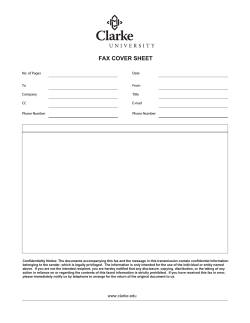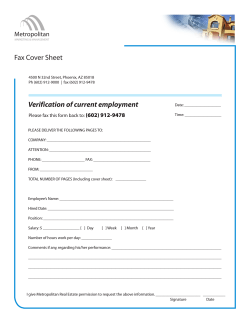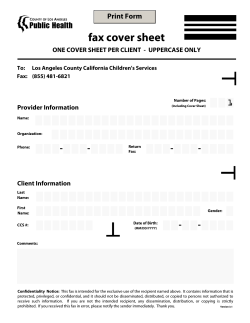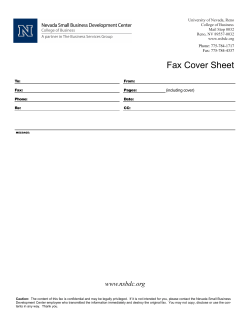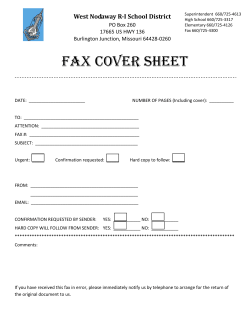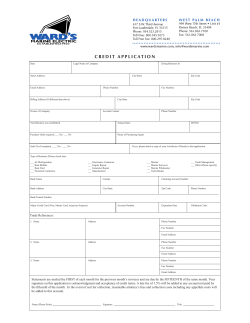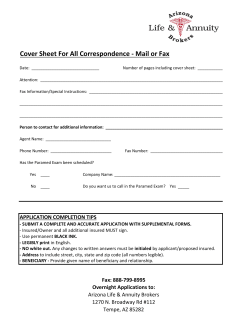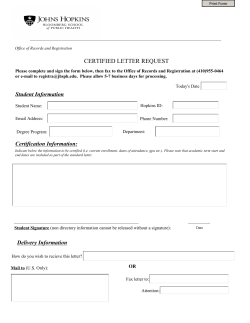
Speakers List (FY 2014-15) - Association for Women Geoscientists
AWG Distinguished Lecturer Program Welcome to the AWG Distinguished Lecturer Program! We have a wide array of lecturers available to speak to your group. The AWG Foundation, a non-profit organization, receives donations to help offset the travel costs of these speakers (up to $800). To arrange for approval of a lecturer engagement or for more information, please contact: Camille Partin AWG Distinguished Lecturer Coordinator camille.partin@usask.ca AWG DLP WEBSITE: http://www.awg.org/AWG_PPDLP/index.htm For more information on AWG and its programs, please see our website (www.awg.org) or email office@awg.org Last updated Jan. 29, 2015 How to Apply for Funding • • • • • 1. 2. 3. All academic institutions, including University and College departments or science clubs/organizations, as well as State Geological Surveys, are invited to apply for funding to host a lecturer from the AWG Lectures List. If in doubt, ask the Lecture Coordinator. Organizations may ask for up to $800 to fund the lecturer’s visit and should provide details of the expected costs. Only one award is to be given to any organization in one year. There is no problem if two organizations ask for the same lecturer. Funding covers the expenses of hosting an AWG lecturer at the institution. Funds are not to benefit the individual: thus, an honorarium is not included in the expenses. Regular and normal travel expenses (airfare, other transportation, meals, lodging) are all applicable costs that could be funded. It is also helpful if the sponsoring institution is able to provide funding for some of the costs so that the requested amount is in line with the maximum allowable grant amount. Funding decisions are the prerogative of the Lecture Coordinator Please follow this procedure to apply for a grant: Contact a lecturer from the list. Settle on a tentative date for the talk, and determine the transportation, lodging, and incidental costs of the visit. Write a letter or email to the Lecture Coordinator including all of the pertinent information, and stress your intention to expose your students to the women geoscientists. Plan for sufficient time for processing the request (several weeks) so that a talk will not be scheduled in advance of AWG being able to approve reimbursement to your department. After the lecture please provide a report of the event including the following documentation and information to insure prompt reimbursements to the lecture coordinator: – the number of people in attendance and % women – describe the audience – provide copies of flyers or other seminar advertising – give a brief description of the quality of the seminar and any other interactions between the lecturer and audience – Please submit all applicable receipts and request for reimbursement to the AWG Lecture Coordinator. Lecture Topics § § § § § § § § § § Atmospheric science...............................4 Climate change.......................................5 Surficial processes..................................6 Deep earth..............................................7 Natural hazards......................................8 Geobiology.............................................9 Energy & policy.....................................10 Leadership & education........................11 Oceanography.......................................12 Space science.......................................13 List of speakers.....................................14-18 Atmospheric Science (Speaker in bold. Contact informa5on provided at the end of the document) Taking the Power out of the Wind: The rela5onship between wind energy and the atmosphere The Global Chlorine Cycle Adams Barnes Atmospheric brown clouds: predic5ng the ver5cal profile of par5culate carbon Carlton Are gas phase chemical mechanisms s5ll sufficient to model air quality and climate? Dust storms and red 5des Phosphorus -‐ the devils element Paytan Impacts of ocean sea spray on on clouds and climate Prather Impact of dust and bioparticles and dust on clouds and precipitation processes Global nitrous oxide emissions – from top-‐down and boMom-‐up Fires in the Earth System Biosphere-‐Atmosphere Interac5ons: how vegeta5on and the atmosphere impact each other Saikawa Wiedinmyer Climate Change (Speaker in bold. Contact informa5on provided at the end of the document) Topographical Forcings of the Ross Ice Shelf Air Stream in Antarc5ca Adams Climate change and ocean change in Antarc5ca and South Georgia Eaton Geomorphic effects of wildfire Florsheim Gremes Cordero From micro to macro: ocean surface processes that influence climate change Glacial Lake Discharges and Abrupt Climate Change: Lake Champlain Manley Understanding Climate Change: Seeing the Carbon Through the Trees McFarlane The challenge of predic5ng the climate of the coming decades Msadek Simula5ng today's climate and future climate change Biopar5cles in the clouds: Nature’s way of controlling our climate? Prather Surficial Processes (Speaker in bold. Contact informa5on provided at the end of the document) Eolian Explora5ons: Dunes, Diagenesis, and Deforma5on A Perspec5ve of Hot Topics in Sedimentary Geology Chan Floods and megafloods: Geomorphic and clima5c signatures of paleofloods in the US and India Ely Impacts of natural dams on river channel evolu5on: Does the river give a dam? Effects of anthropogenic and natural disturbances on sediment dynamics Florsheim Goldilocks and the Three Biogenic Carbonate Minerals: What Determines Just Right? Hallock-‐Muller Spa5al paMerns of erosion in the Three Rivers Region, SW China Henck Schmidt Understanding hydrological processes of rivers draining the Tibetan Plateau Water quality and forest hydrology in the Lake Victoria basin, Uganda What you can learn from da5ng in bars: Using op5cally s5mulated luminescence (OSL) to inves5gate fluvial processes Impacts of lithological heterogeneity on valley evolu5on and floodplain wetland preserva5on in the eastern interior of South Africa Lacustrine sediment dri_s: Lake Champlain Seiche, furrows, pockmarks and ship wrecks: Dynamics in Lake Champlain Forest Carbon Cycling: Insights Gained from Radiocarbon Measurements Soil: More Than What We Grow On What can we learn from mud? All streams flow into the sea even those we cannot see Remedia5on of sulphide mine waste The development of acid mine drainage Jovanelly Keen-‐Zebert Manley McFarlane Paytan Sherriff Deep Earth (Speaker in bold. Contact informa5on provided at the end of the document) The In’s and Out’s of Subduc5on Zones: A stable isotope perspec5ve of geochemical cycling through subduc5on zones The role of serpen5nites in the tectonic history of high-‐grad blocks from the Franciscan Complex, California Tourmaline: A Geologic DVD Mineral textures – ghosts of plutons past Gemstones as guides to Earth’s evolu5on Geology and geophysics at the forefront of polar explora5on, then and now Elemental recycling in subduc5on zones: mass transfer from subduc5ng slab to the crust Timescales and consequences of par5al mel5ng in orogeny New Insights into the Galapagos Mantle Plume Source The Galapagos and Easter Island Hotspots: Bilateral Geochemical Asymmetry as a Mechanism to Map the Lower Mantle New direc5ons in computa5onal geodynamics: exploring the Earth's dynamics with computer models and scien5fic visualiza5on Journey to the center of the Earth: dynamics of the mantle Mel5ng the mountains: crustal flow and collapse Subduc5on metamorphism at the slab-‐mantle interface and exhuma5on of high-‐pressure rocks from the 'point of no return’ Garnet tectonics Mantle to surface dynamics during the transi5on from subduc5on to collision to tectonic escape (an example from Turkey) Con5nental subduc5on and crustal mel5ng in the Western Gneiss Region, Norway Barnes Dutrow Eaton Gordon Harpp Kellogg Whitney Natural Hazards (Speaker in bold. Contact informa5on provided at the end of the document) Geological and historical evidence of past earthquakes and tsunami in Chile Ely The 2005 Erup5on of Sierra Negra Volcano, Galapagos Harpp Prehistoric earthquake-‐triggered slumping in Lake Champlain Manley Dynamics of Explosive Volcanic Erup5ons Computa5onal Simula5ons of Supersonic Volcanic Jets Ogden Forma5on of Volcanic Vents and Craters Forecas5ng Erup5ons at Alaskan Volcanoes: High-‐Stakes Science in Real-‐Time Prejean Earthquake Triggering at Volcanoes: Geophysical Clues to Magma System Dynamics What Has Geodesy Done For You Lately, UNAVCO's Role in Hazards Mi5ga5on and Resource Management Rowan Arsenic and old waste: geochemistry and mineralogy of gold mine waste Sherriff Geobiology (Speaker in bold. Contact information provided at the end of the document) The trouble with trilobites (trilobite ex5nc5on) Controlling biogenic SOA One hundred mammoths in a hot tub Brandt Carlton Dutrow Tales from the Galapagos Islands: Where Geology and Biology Meet Harpp The other fossil record of the Burgess Shale: Exploring the poten5al of ichnology in unravelling taphonomy and ecology Trace fossils and evolu5onary paleoecology: Animal-‐substrate interac5ons and the changing ecology of the past The trace-‐fossil record of the Cambrian explosion Mangano Breathing new life into ancient biomarkers: understanding the biological func5on of hopanoids Newman When rhinos, elephants, and camels roamed Louisiana: Miocene vertebrate animals and their paleoenvironments from the Fleming and Pascagoula Forma5ons Schiebout The role of Decapods (Shrimp, Lobsters, and Crabs) in the Mesozoic Marine Revolu5on Lobster Diversity through 5me Schweitzer Shrimp, Lobster, and Crab diversity through 5me: environments and compe55on Early (Archean) life on Earth: the rock record Using plants for environmental remedia5on and restora5on Walsh Energy and Policy (Speaker in bold. Contact informa5on provided at the end of the document) Keeping the Lights On: Understanding the Interplay between Weather, Climate, and the US Electricity Grid Adams A Geoscien5st in Antarc5ca: Following in Shackleton's Footsteps One Hundred Years Later Eaton The effects of Chinese land use policies on erosion in western China Henck Schmidt Rebuilding a_er tsunami disaster: case studies from Japan Jovanelly What is the Intergovernmental Panel on Climate Change and what can we learn from it? Msadek Policy diffusion of emission standards: is there a race to the top? Solving mineralogical puzzles of Roman poMery Saikawa Sherriff Environmentally Persistent Free Radicals (EPFRs): their chemistry, forma5on and health effects (communica5ng research findings from the LSU Superfund Research Program) Walsh Air Quality and Health Cooking Impacts on Air Quality, Climate, and Health in a Changing World Wiedinmyer Leadership and Education (Speaker in bold. Contact informa5on provided at the end of the document) It started with a rock collec5on: Charles Darwin, Geologist Brandt Powerful collabora5on between scien5sts, ar5sts, writers and educators Eaton Making the transi5on from academics to industry Managing a work/life balance Geing what you want by asking for what you need Nielsen Promo5ng science literacy by combining interdisciplinary and experien5al teaching styles Jovanelly Diagenesis and metamorphism: Geological lessons for leadership Geology and leadership: Lessons from the field Rossbacher Leadership in the Holocene: What women leaders can learn from the geosciences Riding ahead of the herd: A cowgirl's guide to leadership The Role of the Geosciences in Policymaking: How to Avoid Being Stuck Between a Rock and a Hard Place The Status of the Geosciences in Educa5on, Workforce and Public Policy Rowan How to Communicate The Value of the Geosciences to the Public and Policymakers Increasing student engagement through service-‐learning in an environmental management curriculum Walsh Oceanography (Speaker in bold. Contact informa5on provided at the end of the document) 2010 Elysium Visual Epic Expedi5on -‐-‐ an overview Eaton 1914-‐17 Imperial Trans-‐Antarc5c Expedi5on -‐-‐ an overview Air-‐sea transfer related to climate change Energy dissipa5on at the ocean surface related to mixing in the whole ocean Sediment mudwaves of the North and South Atlan5c Gremes Cordero Manley North Atlan5c sediment dri_s Understanding the physics of the ocean using numerical models and observa5ons Msadek What is the difference between weather and climate and what can the oceans tell us? Ocean acidifica5on: the other CO2 problem Paytan Space Science (Speaker in bold. Contact informa5on provided at the end of the document) Mars for Earthlings: Using Sedimentary Analogs to Decode Mars Geology Chan Mars Magne5c Mystery Ac5ve tectonics on Venus: Evidence from Coronae & Chasmata Earth hotspots and Venus coronae SETI: the Search for Extra Terrestrial Intelligence Titan's Mysteries Jurdy List of Speakers (A-E) Manda Adams UNC-Charlotte (former) (704) 687-5984 manda.adams@uncc.edu https://clas-pages.uncc.edu/manda-adams/ Jaime Barnes The University of Texas at Austin Department of Geological Sciences 1 University Station C1100 Austin, Texas 78712 jdbarnes@jsg.utexas.edu Danita Sue Brandt Department of Geological Sciences Michigan State University E Lansing, MI 48824-1115 (517) 355-6595; (517) 353-8787 (fax) brandt@msu.edu Annmarie Carlton Department of Environmental Sciences Rutgers University 14 College Farm Road New Brunswick, NJ 08901 (732) 932.9800 x6230 carlton@envsci.rutgers.edu Marjorie A. Chan Department of Geology & Geophysics University of Utah, 115 S. 1460 E. Rm. 383 FASB Salt Lake City, UT 84112-0111 (801) 581-6551; (801) 581-7065 (fax) Marjorie.chan@utah.edu Barbara L Dutrow Department of Geology & Geophysics Louisiana State University Baton Rouge, LA 70803-4101 (225) 578-2525; (225) 578-2302 (fax) dutrow@lsu.edu Susan R. Eaton SR ECO Consultants Inc. 2031-8th Avenue S.E. Calgary, Alberta T2G 0N7 CANADA (403) 508-2512; (403) 508-5012 fax susaneaton@shaw.ca http://www.susanreaton.com/ Lisa L. Ely Department of Geological Sciences Central Washington University 400 E. University Way Ellensburg, WA 98926 (509) 963-2177; (509) 963-2821 (fax) ely@cwu.edu List of Speakers (F-J) Joan L. Florsheim Research Scientist Earth Research Institute (ERI) University of California, Santa Barbara joan.florsheim@ucsb.edu Silvia Gremes Cordero Assistant Professor - Research Physics, University of New Orleans Resident at Naval Res. Lab - SSC (228) 688-5129, sgremesc@uno.edu Stacia M Gordon Dept of Geological Sciences University of Nevada, Reno 1664 N. Virginia, MS 0172 Reno, NV 89557 (775) 784-6476 staciag@unr.edu Pam Hallock-Muller College of Marine Science University of South Florida 140 Seventh Ave. S. St.Petersburg, FL 33701-5016 (727) 533-1567; (727) 553-1189 (fax) pmuller@marine.usf.edu http://www.marine.usf.edu/reefslab Karen Harpp Department of Geology Colgate University 13 Oak Drive Hamilton, NY 13346 (315) 228-7211; (315) 228-7187 (fax) kharpp@colgate.edu Amanda Henck Schmidt (no requests for Fall ’14; maternity leave) Department of Geology Oberlin College 52 W. Lorain St. Oberlin, OH, 44074 (440) 775-8342; (440) 775-8038 (fax) aschmidt@oberlin.edu Tamie J. Jovanelly Associate Professor of Geology Berry College 2277 Martha Berry Hwy Mnt Berry, GA 30149 (706) 238-5868 tjovanelly@berry.edu Donna M. Jurdy Professor, Department of Earth & Planetary Sciences 2145 Sheridan Road - F496 Northwestern University Evanston, IL 60208-3130 donna@earth.northwestern.edu List of Speakers (K-O) Louise Kellogg Professor, Department of Earth & Planetary Sciences University of California, Davis, CA 95616 (530) 752-3690 http://mygeologypage.ucdavis.edu/kellogg/ http://www.keckcaves.org kellogg@ucdavis.edu Amanda Keen-Zebert Assistant Research Professor-Geomorphology Dir. E.L. Cord Luminescence Lab Desert Research Institute 2215 Raggio Parkway Reno, NV 89512-1095 (775) 673-7434 akz@dri.edu http://www.dri.edu/luminescence-lab M. Gabriela Mangano Department of Geological Sciences University of Saskatchewan 114 Science Place Saskatoon, SK S7N 5E2, CANADA gabriela.mangano@usask.ca Patricia Lee Manley Geology Department Middlebury College Middlebury, VT 05753 (802) 443-5430; (802) 443-2072 (fax) patmanley@middlebury.edu Karis J. McFarlane Center for Accelerator Mass Spectrometry Lawrence Livermore National Laboratory 7000 East Ave, L-397 Livermore, CA 94551-9234 (925) 423-6285; (925) 423-7884 (fax) mcfarlane3@llnl.gov Rym Msadek (no requests for Fall ’14; maternity leave) GFDL/NOAA Princeton University Forrestal Campus 201 Forrestal Road Princeton 08542 NJ (609) 452-6564 Rym.Msadek@noaa.gov Dianne K. Newman Howard Hughes Medical Institute California Institute of Technology 1200 E. California Blvd., Mail Code 147-75 Pasadena, CA 91125 (626) 395-3543; (626) 395-4135 (fax) dkn@caltech.edu http://dknlab.caltech.edu/ Tina Nielsen Associate Director, Great Lakes Bioenergy Research Center University of Wisconsin-Madison Madison, WI 53706 tina.mj.nielsen@gmail.com List of Speakers (P-S) Darcy Ogden Institute of Geophysics and Planetary Physics Scripps Institution of Oceanography (858) 534-7386 http://sites.google.com/site/darcyogden/ dogden@ucsd.edu Adina Paytan Earth & Planetary Sciences Department University of California Santa Cruz Santa Cruz, CA 95064 (831) 459-4089; (831) 459-3074 (fax) apaytan@ucsc.edu Kimberly Prather Dept. of Chemistry and Biochemistry Scripps Institution of Oceanography University of California, San Diego La Jolla, CA 92093-0314 (858) 822-5312 http://www-chem.ucsd.edu/research/profile.cfm?cid=C04185 kprather@ucsd.edu Stephanie G. Prejean Research Geophysicist USGS Alaska Volcano Observatory 4210 University Dr., Anchorage AK, 99508 (907) 786-746 sprejean@usgs.gov Lisa A. Rossbacher, President Humboldt State University 1 Harpst Street Arcata, CA 95521 (707) 826-3311 Lisa.Rossbacher@humboldt.edu humboldt.edu/president Linda Rowan UNAVCO 6350 Nautilus Drive Boulder CO 80301-5394 (303) 381-7571; (303) 381-7501 (fax) www.unavco.org rowan@unavco.org Eri Saikawa Department of Environmental Sciences Rollins School of Public Health Emory University 400 Dowman Drive, Math and Science Center E512 Atlanta, GA, 30322 (404) 727-0487 eri.saikawa@emory.edu Judith A. Schiebout Louisiana State University Museum of Natural Science Baton Rouge, LA 70803 (225) 578-2717 jschie@lsu.edu List of Speakers (S-W) Carrie Schweitzer Department of Geology 221 McGilvrey Hall Kent State University Kent, Ohio 44242 (330) 244-3303; (330) 672-7949 (fax) cschweit@kent.edu Barbara L. Sherriff Director Sherriff Environmental, Inc. Powell River, BC Canada sherriff@ms.umanitoba.ca Maud M. Walsh School of Plant, Environmental and Soil Sciences Louisiana State University Baton Rouge, LA 70803 (225) 578-1211; (225) 578-1403 (fax) evwals@lsu.edu Christine Wiedinmyer National Center for Atmospheric Research 1850 Table Mesa Drive Boulder, CO 80305 (303) 497-1414 christin@ucar.edu Donna L. Whitney Department of Earth Science University of Minnesota Minneapolis, MN 55455 (612) 626-7582; (612) 625-3819 (fax) dwhitney@umn.edu
© Copyright 2025
